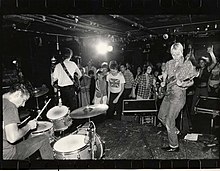The Rathskeller (known as The Rat) was a [1][2][3] live music venue in Boston that was open from 1974 to 1997. It was considered the "granddaddy" of Boston rock venues.[4][5]
"The Rat" | |
 | |
 | |
| Location | 528 Commonwealth Avenue Kenmore Square, Boston 42°20′54.97″N 71°5′46″W / 42.3486028°N 71.09611°W |
|---|---|
| Owner | Jimmy Harold |
| Type | Music venue |
| Genre(s) | Punk rock, alternative rock, hardcore punk, garage rock, rock and roll |
| Construction | |
| Opened | 1974 |
| Closed | 1997 |
| Demolished | 2000 |
During its heyday, the Rat hosted such acts as the Cars, the Pixies, Metallica, Dead Kennedys, the Ramones, Talking Heads, R.E.M., Dinosaur Jr., The Replacements, the Police, and Soundgarden. From 1980 to 1987, The Hoodoo BBQ, which Esquire called one of the "100 Best Restaurants in America"—was located at The Rat.[6]
In the 1960s the Rat was a restaurant and bar catering to college students. At the time, it offered live music in a back room, featuring local bands such as the Remains (who opened for the Beatles on their final tour), the Lost (with future Boston punk legend Willie "Loco" Alexander) and The Mods (whose drummer Harry Sandler went on to play with "Boston Sound" hitmakers Orpheus). The Remains were so popular in 1965 the owner of the Rathskeller was forced to open up the basement for the overflow crowds that the Remains attracted. Live music was phased out in the late 1960s, returning in 1974.[7]

The "locus of boston rock and roll,"[8] the Rat was noted for the artists who performed there before their commercial breakthroughs and the local bands and scenes it helped to develop. In 1976, the album Live at The Rat was released; it documented the music of the time as well as the importance of the club in the development of Boston rock and roll.[9] The WBCN Rock & Roll Rumble was held at the Rat for its first three years and was originally referred to as "The Rumble at the Rat."[10]
The Rat was also considered important for its contribution to the Hardcore movement. In a 2010 interview, Ken Casey of the Dropkick Murphys said: "(The Rat) afforded us the opportunity to have a place to play and develop our fan base, and it was just amazing to us. And the reason I credit it with all of our success, was this is how we started to tour. The hardcore punk scene in the mid-’90s was huge in Boston."[1]
References to the Rat's cultural impact can be found in the book All Souls, The Sound of Our Town, the film All Ages: The Boston Hardcore Film,[11] and in both Guitar Hero II and Guitar Hero Encore: Rocks the 80s.
The Rathskeller closed in November 1997, and was torn down in October 2000 to make way for the Hotel Commonwealth,[12] a 148-room luxury hotel of which Boston University is a limited partner.
The band Camper Van Beethoven, pejoratively referred to the club in their 1988 song "Never Go Back" ("Never going to go back to the Rat and play another mafia show again").
In 2002, The Mighty Mighty Bosstones released a song on their album A Jackknife to a Swan lamenting the loss of the Rat titled "I Want My City Back."
References
edit- ^ a b Baker, Matthew Reid (July 2010). "Top of Mind: Ken Casey, Extended Version". bostonmagazine.com. Boston Magazine. Retrieved 29 July 2014.
- ^ Sullivan, Jim (15 November 1997). "Kenmore Square's fabled Rat to close this weekend". The Boston Globe. p. C.5.
- ^ Quint, Al (18 November 2007). "Suburban Voice On The Rat". Retrieved 3 February 2013.
- ^ "Culture Brats, Bars of Our Youth". Retrieved 3 February 2013.
- ^ "Time Magazine via Boston Groupie News". Retrieved 3 February 2013.
- ^ "Boston Phoenix On The Rat". Retrieved 3 February 2013.
- ^ "The Rat". mmone.org. 30 July 2012. Retrieved 17 March 2015.
- ^ "The Changing Face of Kenmore Square, BU Today". Retrieved 3 February 2013.
- ^ "Live At The Rat at All Music". AllMusic. Retrieved 3 February 2013.
- ^ Sabulis, Thomas (6 July 1979). "Winner is Neighborhoods in the Battle of the Bands". The Boston Globe. p. 28.
- ^ "Boston Hardcore at IMDB". IMDb. Retrieved 3 February 2013.
- ^ "Hotel Commonwealth, News". Retrieved 3 February 2013.